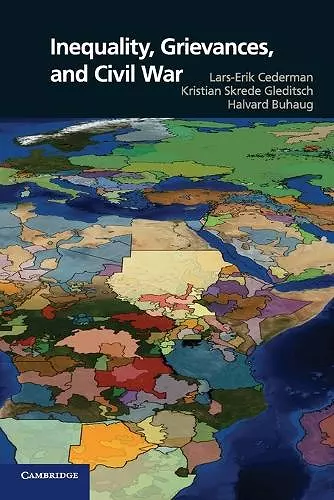Inequality, Grievances, and Civil War
Lars-Erik Cederman author Kristian Skrede Gleditsch author Halvard Buhaug author
Format:Paperback
Publisher:Cambridge University Press
Published:26th Aug '13
Currently unavailable, and unfortunately no date known when it will be back
This paperback is available in another edition too:
- Hardback£78.00(9781107017429)

This book argues that political and economic inequalities following group lines generate grievances that in turn can motivate civil war. Lars-Erik Cederman, Kristian Skrede Gleditsch, and Halvard Buhaug offer a theoretical approach that highlights ethnonationalism and how the relationship between group identities and inequalities are fundamental for successful mobilization to resort to violence. Although previous research highlighted grievances as a key motivation for political violence, contemporary research on civil war has largely dismissed grievances as irrelevant, emphasizing instead the role of opportunities. This book shows that the alleged non-results for grievances in previous research stemmed primarily from atheoretical measures, typically based on individual data. The authors develop new indicators of political and economic exclusion at the group level, and show that these exert strong effects on the risk of civil war. They provide new analyses of the effects of transnational ethnic links and the duration of civil wars, and extended case discussions illustrating causal mechanisms.
'The role of grievances in insurgency and civil war has had a roller coaster career since the 1970s. Once regarded as prime causes of these conflicts, grievances subsequently were shelved in favor of factors like resources, political opportunities, and state capacity. Inequality, Grievances, and Civil War makes a persuasive case that the literature has thrown the baby out with the bath water. Based on the methodologically sophisticated analysis of comprehensive new cross-national databases, Cederman and his associates reinstate the causal priority of shared grievances in explaining civil war - an achievement that has profound policy implications. A must-read for scholars of civil conflict.' Michael Hechter, Arizona State University and the University of Copenhagen
'The cross-national study of civil wars built its initial reputation on two striking claims. First, civil conflict is driven more by opportunities and less by grievances. Second, ethnic diversity is not a driver of violent civil conflict. A long and inconclusive debate followed and several major studies were conducted to probe these initial findings. Inequality, Grievances, and Civil War provides very robust evidence in support of the claim that grievances do matter after all and that ethnicity is a key driver of conflict when conceptualized in terms of the inequalities between ethnic groups. This is a major contribution that will shape research on civil conflict in a decisive way.' Stathis Kalyvas, Yale University, Connecticut
'Over the past many years, political scientists and economists have tried to evaluate group-level grievances through demographic measures such as fractionalization and polarization. Cederman, Gleditsch, and Buhaug first show why these measures fail to capture the force of political and economic exclusion and the logic of nationalism. Then they create new conceptualizations and corresponding measures, and collect a massive amount of appropriate and detailed data to test their hypotheses. The end result is a convincing argument that specifies the power of ethnic group grievances in the onset of conflict as well as its duration and outcomes. For both substantive and methodological reasons, this book should be required reading in classes on ethnic politics and ethnic conflict.' Roger Petersen, Arthur and Ruth Sloan Professor of Political Science, Massachusetts Institute of Technology
'In contrast to many contemporary analyses of violent conflict, this brilliant book takes the expressed motives of conflict participants seriously as well as the evident identity basis of most civil wars. It confirms the view that political and economic horizontal inequalities are a fundamental cause of conflict. The book is a refreshing challenge to both those who take a Hobbesian view of human nature and those who assume that individual greed is an all-embracing motive.' Frances Stewart, University of Oxford
- Winner of Best Book Award, Conflict Processes Section, American Political Science Association 2014
- Joint winner of Annual Best Book Award, International Studies Association 2015
- Joint winner of Book of the Year Award, Conflict Research Society 2014
- Joint winner of NEPS Medal for the Best Publication in Peace Science, Network of European Peace Scientists 2014
ISBN: 9781107603042
Dimensions: 229mm x 152mm x 16mm
Weight: 380g
276 pages